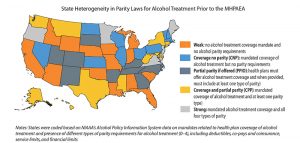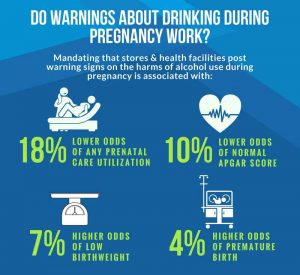State Parity Laws May Explain Why Federal Policy Aimed at Increasing Access to Alcohol Treatment Services Shows Modest Effect N. Mulia, C.K. Lui, Y. Ye, M.S. Subbaraman, W.C. Kerr, T.K. Greenfield Summary The purpose of this policy brief is to assess the effectiveness of the 2008 Federal Mental Health Parity and Addiction Equity Act (MHPAEA) on treatment admissions for people with substance use issues. This is the first assessment to consider the moderating effect of pre-existing … [Read more...]
Policymakers
-
WA SUPPORT FOR MARIJUANA LEGALIZATION GREW
If the vote for marijuana legalization in Washington State were to be held again, Initiative 502 (I-502) would potentially have a stronger majority than it did in November 2012
-
WASHINGTON REGRETS VOTE TO END MONOPOLY
20 percent of individuals who voted in 2011 to end the government monopoly on liquor sales have changed their minds.
Our research helps inform local, national and international policies and seeks to reduce alcohol-related harms. We have looked at the impact of federally mandated warning labels, the role of research in policy making, effects of medical marijuana and cannabis legalization, and effects of changes in treatment systems and other social programs.
A 10% increase in access to alcohol outlets was significantly associated with a 4.2% rise in violent crime in Baltimore, MD, a new study from ARG postdoctoral fellow Pamela Trangenstein found. Trangenstein and her team from Johns Hopkins also assessed whether the type of outlet made a difference, with results showing that greater access to off-site outlets was associated with a 4.4% increase in violent crime compared to 3% for on-site. This is the first ecologic study in the U.S. to use spatial … [Read more...] Stricter policies linked to lower rates of alcohol-related injuries
International study finds government restrictions on drinking curbs injuries despite alcohol use rates and patterns
Emeryville, CA (June 27, 2018): Countries with stricter alcohol policies had lower rates of alcohol-related injuries, regardless of individual consumption rates and drinking patterns, and country-level drinking patterns, a new study from the Alcohol Research Group (ARG), a program of the Public Health … [Read more...] Policies targeting alcohol use during pregnancy tied to worse birth outcomes
New study suggests even “supportive” policies lead women to delay or avoid prenatal care
Emeryville, CA (June 18, 2018) – A majority of state-level policies targeting women’s alcohol consumption during pregnancy—even policies designed to support pregnant women—lead to more adverse birth outcomes and less prenatal care utilization, according to a new study from ARG and Advancing New Standards in Reproductive Health … [Read more...] According to a new national study, 7.4 percent of surveyed respondents reported that children in their care experienced harm as a result of someone else’s drinking. By comparison, previous studies in the U.S. have found general child maltreatment rates to be approximately 1 to 2 percent. The results were published online in the Journal of Pediatrics.
Respondent caregivers who experienced alcohol’s harm from a spouse or partner, or if they lived with a heavy drinker, were almost four times … [Read more...] A new study from ARG Senior Scientist Sarah E. Zemore and colleagues found that people in recovery who attended alternative support groups experienced more cohesion and greater satisfaction when compared with members of traditional 12-step programs. Alternative programs included Women for Sobriety, LifeRing, and SMART Recovery. Study team members included ARG scientists Lee Kaskutas and Amy Mericle, and research associate Jordana Hemberg.
Results also indicated that people who attended … [Read more...] Cancer survivors were more likely to report heavy drinking and more frequent heavy drinking occasions compared to others at the same ages with similar drinking histories, according to a new study from the Alcohol Research Group, a program of the Public Health Institute. Heavy drinking was defined as having five or more drinks at any one time.
When racial and ethnic group-specific effects were evaluated, this increased heavy drinking was found to occur among women and Whites, while no increase … [Read more...] County-level suicide rates in the U.S. had a strong positive relationship with county poverty rates, while no relationships were found between county measures of unemployment or foreclosures when poverty rates were controlled, according to a new study from the Alcohol Research Group, a program of the Public Health Institute, in collaboration with University of California, Los Angeles; Oregon Health and Science University; Prevention Research Center; and the Centre for Addiction and Mental … [Read more...] If the vote for marijuana legalization in Washington State were to be held again, Initiative 502 (I-502) would potentially have a stronger majority than it did in November 2012, according to a new study from the Alcohol Research Group, a program of the Public Health Institute, published today in Contemporary Drug Problems.
Researchers found that among people who voted against I-502, 14 percent would now vote in favor of the measure compared to 4.8 percent of yes-voters who would change their … [Read more...] Washington State residents who voted in favor of privatizing liquor sales were eight times more likely to express a desire to change their original vote than residents who voted against the measure, according to a study from the Alcohol Research Group, a program of the Public Health Institute, published today in the Journal of Studies on Alcohol and Drugs.
Findings suggested that 20 percent of individuals who voted in 2011 to end the government monopoly on liquor sales have changed their … [Read more...]Violent Crime Linked to Liquor Stores
Stricter policies & alcohol-related injuries
Policies Tied to Worse Birth Outcomes
Harms to Children from Other’s Drinking
New Findings on Alternative Support Groups
Cancer Survivors Drink More After Diagnosis
Poverty’s Effect on Suicide Rates
WA Support for Marijuana Legalization Grew
Washington Regrets Vote to End Monopoly
- 1
- 2
- 3
- 4
- Next Page »










